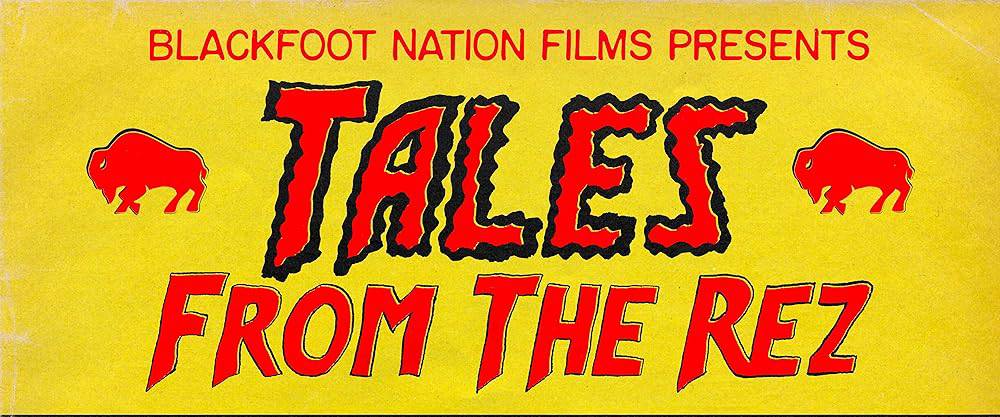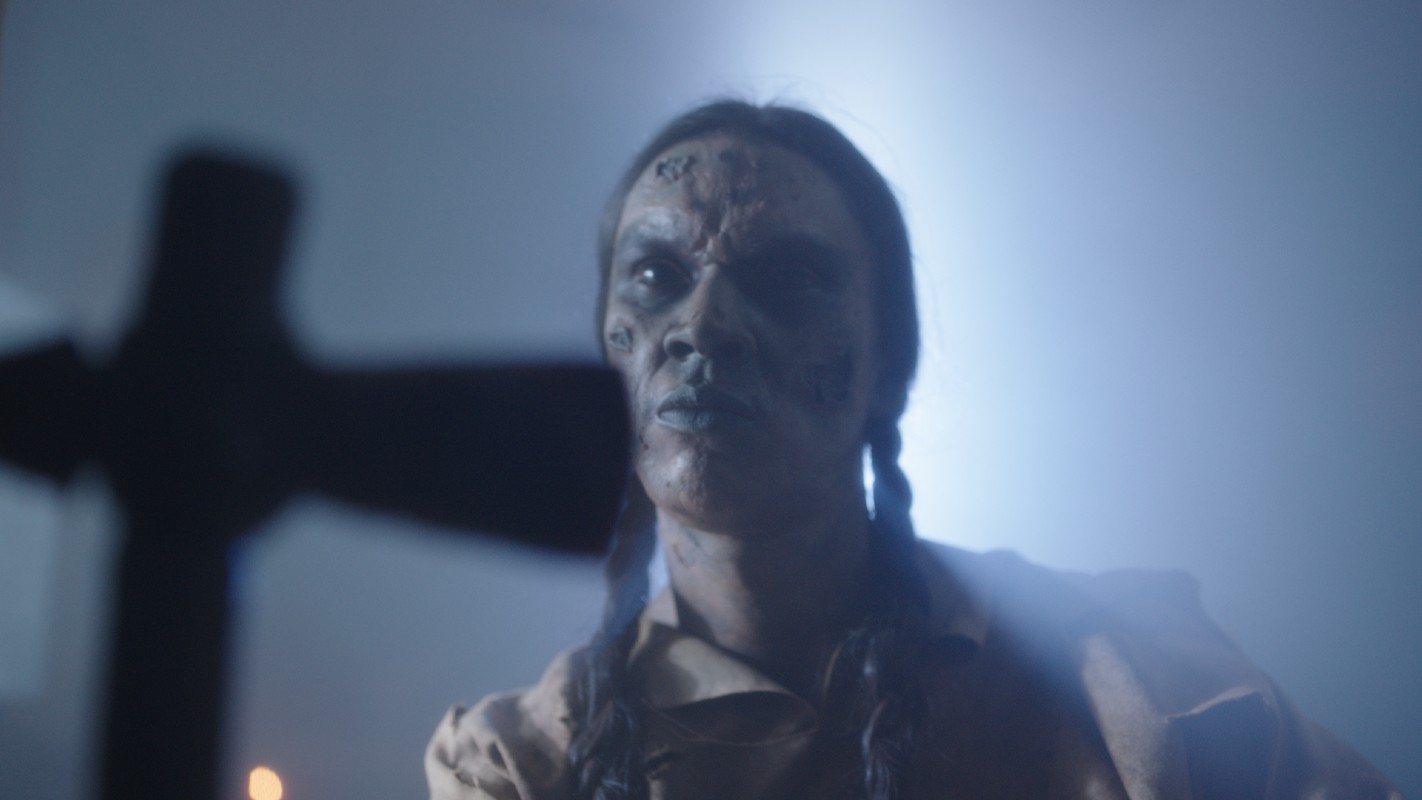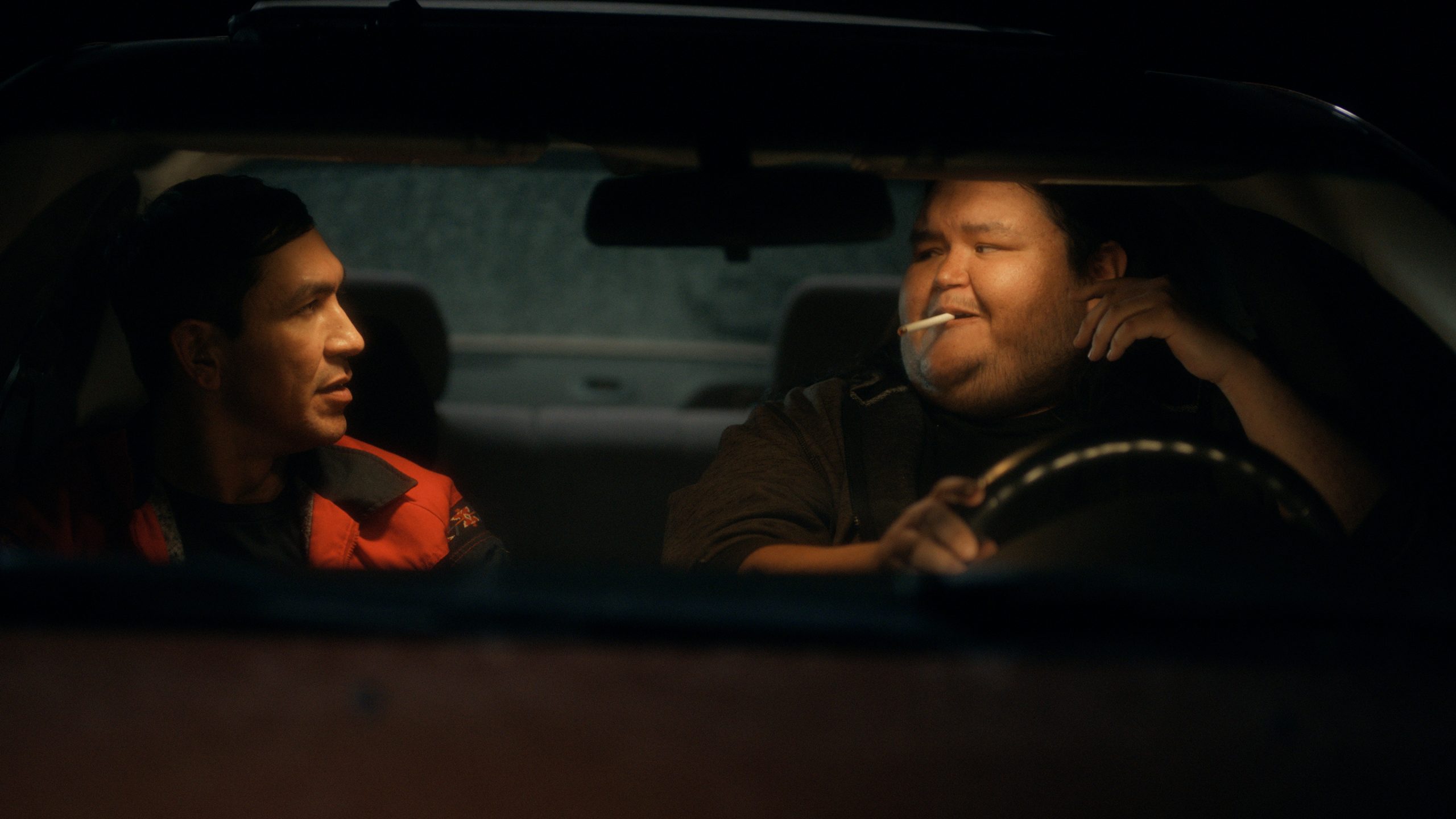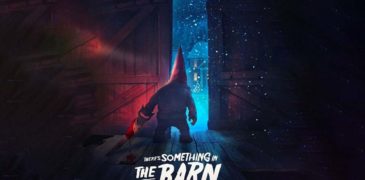
Tales from the Rez is a captivating look into the ghost stories of the Blackfoot Nation, presented in a format that’s instantly familiar to lovers of horror anthologies!
Director Trevor Solway worked with Blackfoot Nation Films to bring to life the stories he heard growing up on a Native Canadian reserve. These ghost stories, overheard from elders gossiping at night or spread from child to child as urban legends, are retold in a way that expresses modern Blackfoot culture.
As we all know, horror – and folk horror specifically – isn’t really about ghosts or monsters. It’s about telling cautionary tales with a strong moral message. And while Tales from the Rez is definitely not suitable for children, it follows the same comforting trope of reflecting real life and its horrors.

The director spoke about colonial horror, and how his stories aim to retell ghost stories while reflecting the real horrors of living on a reservation. Rampant alcoholism, which is a result of European colonialism and continues to afflict Indigenous Canadians, is most notably included – alcohol appears in every single episode, as well as in the framing device. It’s no wonder that the only white actor plays the devil pushing a viscous black spirit.
All the stories in Tales from the Rez are framed by a Blackfoot version of the Crypt Keeper, Uncle Randolf. Swapping dubious wisdom and ghost stories for beer and a pack of smokes, he is presumably a stereotype of a Native Canadian uncle (from my ignorant perspective) and oddly endearing.
The first story, Queen’s Hotel, tackles a lot of serious issues: alcoholism, violence, toxic masculinity, and redemption, not to mention the literal white devil, tempting the protagonist back to the drink, which in this short is black as tar.

Eddie is clearly trying to improve his life after his time in prison, but the expectations of his community and the ghosts from his past continue to weigh him down. The director here is showing how hard it can be to remain true to yourself and your community while always trying to be a better person than yesterday.
Sadly, Eddie is tricked into drinking, and the devil takes his soul. The short ends with a poignant message – “never trust a white man in a suit.”
Grave Consequences sees two young Blackfoot women getting stoned at home, chatting shit, and discussing how to get rich. They debate cross-breeding a chihuahua with a pug – “a Chug!” – but eventually settle on that classic fallback – grave robbing.
Remembering where her ancestors were buried, one of the girls digs up a corpse that’s clinging tightly to a tomahawk – she takes the tomahawk and flings the body back into the grave.

But the dead don’t take kindly to graverobbers!
Giddy Goat was possibly the funniest and most bizarre, with the kind of unexplained situation typical to kids horror series like Are You Afraid Of The Dark, from which this series takes a lot of inspiration. Our protagonist Cecil has a roommate who lives outside, eats small animals, and just so happens to be half-goat.
Desperate to find a lady who will “go full goat”, the pair hit up a Halloween house party, where the goat man’s unique physiology won’t be noticeable. What is noticeable though, is when you decide to eat the household cat and leave its blood splattered over the bathroom walls.
Of course, this wasn’t just anybody’s cat – this cat belonged to the hot girl the goat man’s been internet stalking, and when her friend outs the goat man things go really nuts. Faces are bitten, and blood is flying. In panic, the goat man scrambles, while Cecil chuckles on.

Something In The Water is the kind of tale that elders tell to children – don’t disrespect the earth or water, because everything has a spirit.
In this case, a group of young adults on a camping trip with the intention of getting drunk directly on top of a sacred spiritual site! While Savanna gently warns of not upsetting the spirits – especially the water spirit – the obnoxious orchestrator of this little trip is pissing in the river, discarding his empty bottles, and just generally being a disrespectful little shit.
But it turns out, Granny was right! Savanna makes it back home, by the way. Alone.
Taxi Me To Hell revisits Cecil, the goat man’s friend, right after leaving the cat- and face-eating extravaganza to drive his cousin Wendell home. When Cecil spots a female hitchhiker, he pulls over immediately, despite Wendell’s constant reminders that he needs to be home with his wife. The woman flirts with Cecil and Wendell, but something’s not quite right about her face, and Cecil is about to learn a little something about karma.

The final tale follows Jacob through his own personal purgatory, facing with rage all of his past traumas. This one was more serious than the others; the sight of a man cradling his younger self and telling the child it’s not his fault hits pretty hard. Again we see themes of alcoholism, violence, and abuse, but in a forgiving way,
While the seven stories aren’t directly connected, crossover does happen between episodes, and continuity is maintained through the intense lighting choices that evoke classic 80s horror.
Tales from the Rez was accompanied by a bonus short – Cloud Striker is a beautifully shot, unapologetically furious film portraying the horrors of white religious colonisation. It touches on the very real-life horrors of the unmarked graves of children in Canada’s Christian residential school system – more of these sites are found all the time, prolonging an already centuries-old trauma.
In the end, the son in the story asks his father, “How come we ain’t madder at what they do?” and it’s like a punch to the gut. “I don’t know,” says his dad. “But I’m pretty fucking mad right now.” And honestly? Same.

I think it’s worth noting that as a white British person, I’m about as far from Blackfoot culture as you can get, and I know there was a lot that went over my head. But through the universality of horror tropes, I felt drawn into the stories of this community – like I could sit down with Uncle Randolf, hand him another beer, and ask him to tell me just one more.
As an aside, it would be so interesting to hear a Blackfoot perspective on this film – did you recognise any of the stories? Was it relatable? Can you translate some of the Blackfoot speech for us?
Tales from the Rez is funny, charming, and speaks to universal, timeless lessons that even those unfamiliar with Blackfoot culture can enjoy.

We Watched Tales From The Rez (2023) at Blood in the Snow Film Festival 2023

More Film Festival Coverage
Hunting For The Hag (2023) Film Review [Unnamed Footage Festival 7]
The Woods of Hawthorne, Illinois are Haunted… “I wanted to make a horror movie that toys with your expectations. ‘Hag’ starts as one thing and then morphs into something totally…
Mushrooms (2023) Film Review – Unexpecting and Devastating [Fantastic Fest]
Mushrooms, originally known as Grzyby, is a Polish 2023 mystery thriller, written and directed by Paweł Borowski. Beginning his directorial career with the short animated comedy Love Gamestation (2001), Paweł…
Livescreamers (2023) Film Review – Scream Your Heart Out [Unnamed Footage Festival 7]
Not since 2006’s Stay Alive has video gaming been in the spotlight of horror in the way it is in 2023’s Livescreamers. Directed by Michelle Iannantuono, this sequel to the…
Black Mold (2023) Film Review – Break the Mold [FrightFest]
Black Mold is a 2023 American psychological horror film, written and directed by John Pata. The film stars Agnes Albright and Andrew Bailes as two Urbex photographers, Brooke and Tanner,…
Zalava (2021) Film Review – Superstition, Paranoia and Demons
A little bit of superstition never really hurts anyone and for most people their superstitions are pretty mild. That isn’t the case for the residents of Zalava, a small town…
There’s Something in The Barn (2023) Film Review – If You Give an Elf a Lutefisk [Fantastic Fest[
Every year horror fans are inundated with a slew of holiday-themed horror, with a select few becoming instant classics. Even at Fantastic Fest, where we caught There’s Something in The…
Jenny is a creative copywriter living just outside of Liverpool who loves horror, board games, comics, video games and industrial metal.
![Hunting For The Hag (2023) Film Review [Unnamed Footage Festival 7]](https://www.grimoireofhorror.com/wp-content/uploads/2024/04/Hunting-for-the-Hag-cover-365x180.jpg)
![Mushrooms (2023) Film Review – Unexpecting and Devastating [Fantastic Fest]](https://www.grimoireofhorror.com/wp-content/uploads/2023/09/Mushrooms-cover-365x180.jpg)
![Livescreamers (2023) Film Review – Scream Your Heart Out [Unnamed Footage Festival 7]](https://www.grimoireofhorror.com/wp-content/uploads/2024/03/Livescreamers-2023-cover-Fixed-365x180.jpg)
![Black Mold (2023) Film Review – Break the Mold [FrightFest]](https://www.grimoireofhorror.com/wp-content/uploads/2023/08/Black-Mold10-365x180.jpg)

